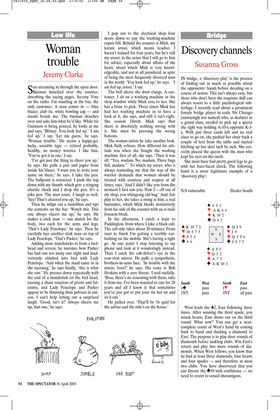Woman trouble
Jeremy Clarke
Sun streaming in through the open door. Barman hunched over the counter, absorbing the racing pages. Jeremy Vine on the radio. I’m standing at the bar, the only customer. A man comes in — blue blazer, club tie, white bowling cap — and stands beside me. The barman slouches over and asks him what he’d like. While his Guinness is being poured, he looks at me and says, ‘Blimey. You look fed up.’ ‘I am fed up,’ I say. ‘Let me guess,’ he says. ‘Woman trouble.’ He seems a happy-golucky, sociable type — retired probably, healthy, no money worries. I like him. ‘You’ve got it in one,’ I say.
‘I’ve got just the thing to cheer you up,’ he says. He pulls a pen and paper from inside his blazer. ‘I want you to write your name on there,’ he says. I take the pen. The ballpoint is retracted. I push the top down with my thumb, which gets a stinging electric shock and I drop the pen. It’s a joke pen. The man roars. I laugh as well. ‘See! That’s cheered you up,’ he says.
Then he whips out a matchbox and tips the contents on the bar. ‘Watch this. This one always cheers me up,’ he says. He makes a stick man — one match for the body, two each for the arms and legs. ‘That’s Lady Penelope,’ he says. Then he carefully lays another stick man on top of Lady Penelope. ‘That’s Parker,’ he says.
Adding more matchsticks to form a bedhead and screen, he narrates how Parker has had one too many one night and inadvertently climbed into bed with Lady Penelope. ‘And when the maid came in in the morning,’ he says finally, ‘this is what she saw.’ He presses down repeatedly with the end of a matchstick on the bed head, causing a chain reaction of pivots and fulcrums, and Lady Penelope and Parker appear to be thrusting their pelvises in unison. I can’t help letting out a surprised laugh. ‘Good, isn’t it? Always cheers me up, that one,’ he says. I pop out to the electrical shop four doors down to pay the washing-machine repair bill. Behind the counter is Mick, my karate sensei, which means teacher. I haven’t trained for four years, but he’s still my sensei, in the sense that I still go to him for advice, especially about affairs of the heart, about which Mick is very knowledgeable, and not at all jaundiced, in spite of being the most frequently divorced man in the world. ‘You look fed up,’ he says. ‘I am fed up, sensei,’ I say.
The bell above the door clangs. A customer. I sit on a washing machine in the shop window while Mick sees to her. She has a bone to pick. Three times Mick has had her washing machine in to have a look at it, she says, and still it isn’t right. She sounds Dutch. Mick says that there is absolutely nothing wrong with it. She must be pressing the wrong buttons.
The woman insists he take another look. Mick flatly refuses. How different his attitude was when she bought the washing machine first of all, she says. ‘Then it was all: “Yes, madam. No, madam. Three bags full, madam.”’ To which my sensei, who is always reminding me that the way of the warrior demands that women should be treated with courtesy and respect at all times, says, ‘And I didn’t like you from the moment I first saw you. Now f— off out of my shop, you whingeing old bag.’ And, fair play to her, she takes a swing at him, a real haymaker, which Mick blocks instinctively from his side of the counter with an oi tsuki forearm block.
In the afternoon, I catch a train to Paddington, from where I take a black cab. The cab ride takes about 20 minutes. From start to finish I’m getting a terrible earbashing on the mobile. She’s having a right go. At one point I stop listening to my phone and look at it wonderingly instead. Then I catch the cab-driver’s eye in the rear-view mirror. He pulls a sympathetic, brothers-in-arms face. ‘In trouble with the missis, boss?’ he says. His voice is Bob Hoskins with a sore throat. I nod ruefully. ‘Boss, there’s no reasoning with them, take it from me. I’ve been married to one for 28 years and all I know is that sometimes you’ve just got to put your tin hat on and sit it out.’ He pulled over. ‘That’ll be 16 quid for the advice and the ride’s on the house.’




















































 Previous page
Previous page